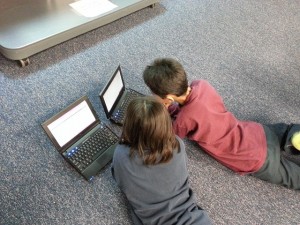Texas has five required subjects for homeschoolers to teach: reading, spelling, grammar, mathematics and good citizenship. You may have to reread that a few times. Perhaps we should assume that a good citizen has a clue about science, music, art, history, and health.
 Even with this limited list, I have some problems. I am not the best speller. Sure I can memorize and pass a test. However, I stand with Mark Twain: “Anyone who can only think of one way to spell a word obviously lacks imagination.” I am clearly not lacking in imagination. Want to play Scrabble? I didn’t learn phonetic spelling rules as a child, and despite my prolific reading, I don’t see words correctly. I vividly remember taking an AP test and writing the word family. It looked wrong to me. I knew it was right. It just looked wrong. I can divide my children quickly by who spells like me and who spells correctly (like their dad).
Even with this limited list, I have some problems. I am not the best speller. Sure I can memorize and pass a test. However, I stand with Mark Twain: “Anyone who can only think of one way to spell a word obviously lacks imagination.” I am clearly not lacking in imagination. Want to play Scrabble? I didn’t learn phonetic spelling rules as a child, and despite my prolific reading, I don’t see words correctly. I vividly remember taking an AP test and writing the word family. It looked wrong to me. I knew it was right. It just looked wrong. I can divide my children quickly by who spells like me and who spells correctly (like their dad).
I can’t say I’m strong on grammar. Aside from Madlibs and School House Rock, I don’t have a wealth of grammar knowledge.
Given my weaknesses how do I teach my children to write? I like to write. I do feel like I have something to say and I like thinking of the best way to word a sentence so it clearly and powerfully conveys my ideas.
My philosophy is simple. I write, then I wait. I wait until my children have something to say. I very, very rarely require writing.
 First, I write. I cannot underestimate the importance of this in the education of my children. I write in journals. I write on blogs. I’ve attempted to write children’s books. I have rejection letters from publishing companies. I have asked my children to edit my writing. I write for fun. I write when I learn something and I want to see if I’ve learned enough to express it. I write. This has forced me to improve my spelling and grammar.
First, I write. I cannot underestimate the importance of this in the education of my children. I write in journals. I write on blogs. I’ve attempted to write children’s books. I have rejection letters from publishing companies. I have asked my children to edit my writing. I write for fun. I write when I learn something and I want to see if I’ve learned enough to express it. I write. This has forced me to improve my spelling and grammar.
Next I wait. While waiting, I limit the writing I require. We don’t do book reports, though we talk about books. We don’t write a lot about history, though we talk about it. Science and math, by nature, require record keeping, but you can bet they will never have to write how they knew 4 + 4 is 8. Sometimes, we wrote about quotes or what we were thinking. I did introduce the five paragraph paper form- with thesis and supporting statements. I have watched my own children and discovered that when I require writing they lose interest in the subject matter and writing itself.
This process started naturally. My kindergartener couldn’t write, so I would talk to her about what we did and learned. It never made sense to change it. As my son came along, his brain worked so fast that writing was a huge frustration to him. He was fine with the mechanics of it, but to write anything meaningfullly was a struggle. I kept most learning and testing in Socratic discussion mode.
I knew that other children would write about what they learned, but I wonder how much of that is a natural consequence of 20 children in a classroom? The teacher cannot physically ask each child what they have learned.
About four years ago, I had a mentor meeting with my daughter to ask her what goals she wanted to set related to her learning. One of her goals was to write one hour a day. She asked for additional computer time to manage that. She kept that goal. She is now sixteen years old, and has written three books through NANOWRIMO. Having read all three in the last few months, I’m astounded at how her writing has improved. Here is her most recent novel.
She writes about two hours a day at least, or more when she’s editing or meeting a deadline. When we began choosing whether to go to high school or continue homeschooling, her primary consideration was whether she would have enough time to write. I don’t know how she just sits and writes but day after day, she does.
My oldest daughter writes poetry and plays and completed her first novel through NANOWRIMO this year. I like her book, but I love her poems and music. She amazes me. She has finished a year of junior college and had no problem with essay tests or the quantity of writing required by her classes. It hadn’t hurt her to have written so little when she was young.
Next, we come to my son, the hesitant, struggling writer. He wrote a book for NANOWRIMO as well. Yes, it helps that he’s typing. He can keep up with his brain better that way. NANOWRIMO requires a huge chunk of writing in one month. With so many of us writing, I did not read anything they wrote until months later. I wondered, really wondered, what exactly he was doing with all of his computer time. I saw and heard the key strokes. The main character’s name is Pizza. He didn’t even ask me to read it until a month before the deadline. I can’t fully express how it felt to read his book. My son. We had struggled with writing so long. I kept most of that to myself. I let him write very, very little. The plot is straightforward . . . friends unite to take on the bad guy.
My twelve-year-old is working on a book. We think she’ll be ready for NANOWRIMO next year.
All four older children have learned about grammar and spelling. They had something to say. They were motivated, so motivated. They were asking me to critique their work. They were asking to be taught about grammar. It is so much more motivating to learn grammar and spelling when you have something you really wanted to say, or a story you want to tell. When I share my children’s books, it’s not because they are perfect. They are fun and an amazing vehicle for learning. Earlier this month there were children scattered around the house reading each other’s books.
I think in the world of worksheets and assignments we miss the power of example and patience.
About Britt Kelly
Britt grew up in a family of six brothers and one sister and gained a bonus sister later. She camped in the High Sierras, canoed down the Colorado, and played volleyball at Brigham Young University. She then served a mission to South Africa.
With all of her time in the gym and the mountains and South Africa, she was totally prepared to become the mother of 2 sons and soon to be 9 daughters. By totally prepared she means willing to love them and muddle through everything else in a partially sleepless state. She is mostly successful at figuring out how to keep the baby clothed, or at least diapered, though her current toddler is challenging this skill.
She feels children naturally love to learn and didn’t want to disrupt childhood curiosity with worksheets and school bells. She loves to play in the dirt, read books, go on adventures, watch her children discover new things, and mentor her children. Her oldest child is currently at a community college and her oldest son is going to high school at a public school. She loves to follow her children in their unique paths and interests.
She loves to write because, unlike the laundry and the dishes, writing stays done. Whenever someone asks her how she does it all she wonders what in the world they think she’s doing.
Twitter •







